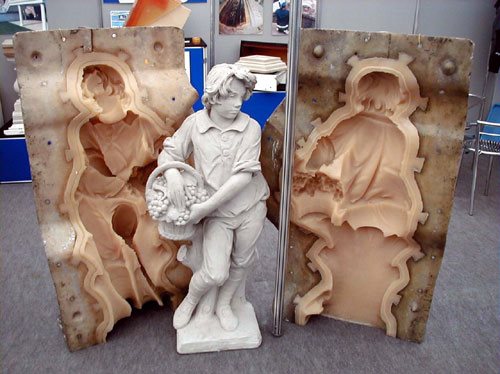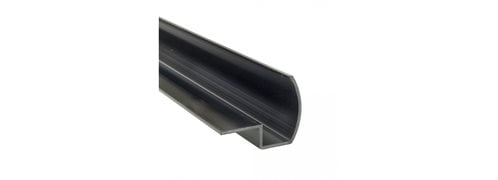- Concrete Molds Home
- Countertop Molds
- Sink Molds
- Stamp & Texturing Tools
- Edge Molds
- Tips for Making and Using Concrete Molds
- Making molds from rubber
- Related Information:
- Concrete countertop forming videos
How to Make Concrete Molds from Liquid Rubber
Liquid rubber is a great way to make durable perfectly smooth molds. There are two main suppliers of urethane rubber for concrete molds: Smooth-On and Polytek. Both make polyurethane rubbers that come as two-part liquids (resin and hardener). Polytek recommends using a 74-45 or a 75-60 material for concrete countertops. The second number indicates the Shore A hardness—a 60 is about the hardness of a car tire and the 45 is a bit softer.
The great advantage of rubber molds is their flexibility. Rubber molds can easily release from intricate details, even undercuts. Rubber molds are used for sinks, drainboards, soap dishes, edges, and many other details. They are typically attached to the countertop mold with silicone caulk and then caulk is applied around them to seal the joint and create a smooth transition.
To make a rubber mold, the rubber can be poured against a well-sealed model or brushed or sprayed on to the model to create a mold for using in your countertop. "We generally recommend poured block molds for concrete," said David Salisbury, president of Polytek. A brush-on or spray-on material can be used, he explains, but then you would have to come back after the rubber cures and add a shell or "mother mold" so that the rubber can hold its shape and support the concrete during casting. This shell would typically be made from polyurethane. There are a couple of advantages Salisbury noted for making poured molds instead of brushed-on: they are more durable and they take less skill to make. "What most countertop makers do is create rubber molds then save them to develop an inventory that can be used on future projects."
To make a complete sink mold, Salisbury still recommends pouring the rubber. But rather than making a big block of rubber that would be heavy and expensive (since the rubber isn't cheap), you would create the model for the sink basin then create a plug of foam or wood that would sit inside the mold. The rubber is then poured into the annular area between the model and the plug, which makes it lighter and provides a central core that can be easily fastened to the countertop mold. Read more about making rubber molds.
Phil Lampe uses Smooth-On Vytaflex to create sink molds. "For a basic oval shaped mold, I bought a cheap oval porcelain sink and made a replica a little bit smaller out of foam that I could hang over the sink. Then I poured the rubber in so that I ended up with a 1-inch-thick rubber skin with the exact sink shape. And then I either use the foam knockout as the backer mold or I use plaster or expandable foam." For a wedge-shaped sink, he built his model from plywood and used the same approach to create the model.
Rubber molds can last for hundreds of castings and will last virtually forever, so long as they are kept our of the sun and the proper release agent is used. "The release agent we use depends on the finishing technique," said Lane Mangum. "Whether you're planning to grind and grout or pop a perfect slab affects how and what kind of form release you use. You don't want form release scum on your countertop if you are trying to pop a perfect slab and don't want to have to grind that scum off."
Both Polytek and Smooth-On supply release agents, although Salisbury defers to the countertop experts for what's best. Smooth-On has a water-based release specifically formulated for concrete—that's what Lampe uses. Karmody said that the need for release agent can even be more pronounced with darker colors of pigment. "Experience has taught us that with certain kinds of colors on certain kinds of materials that we will need a release. So, for example, with polypropylene and some blackpigments the concrete can calcify and so we will use a release, although with most colors that's not an issue."
 Slot Drain Ramp Sink Mold
72" with internal reinforcement
Slot Drain Ramp Sink Mold
72" with internal reinforcement
 Rectangle Sink Mold
Internally reinforced. Ships in 2 to 3 business days.
Rectangle Sink Mold
Internally reinforced. Ships in 2 to 3 business days.
 Mold Making Kit
Create custom rubber molds for concrete casting
Mold Making Kit
Create custom rubber molds for concrete casting







